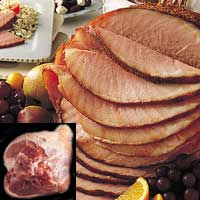Ham

Varieties
Ham is pork that has been cured and sometimes smoked to give it a lively, mildly spiced taste. True ham starts out as the hind leg or shoulder of the pork, which is then either wet- or dry-cured. In wet or brine curing, the pork may be soaked in brine, or have a brine solution (water, salt, sodium nitrite, and sugar) injected into the meat. Dry curing involves rubbing the meat with salt, sodium nitrate, sodium nitrite, sugar, and seasonings. Most ham is sold precooked, but it is always a good idea to check the label to make sure the meat does not require cooking. (Uncured pork leg, sometimes referred to as “fresh ham,” is also available.)
Bone-in ham is sold with the skin on and the shank or leg bone inside. It is available whole or in sections. Slices may be sold as ham steaks.
Boneless ham is ham that has had the shank bone removed and the muscle molded into a football shape. Boneless ham is available whole or in sections.
Country ham is a dry-cured ham; it has been rubbed with salt, dried, and then smoked. Varieties of country ham include Virginia ham and Smithfield ham.
Canned ham has been molded, cooked, and sealed in a can. It has a higher moisture content and a milder taste than bone-in or boneless ham.
Picnic ham or picnic shoulder are types of ham made from the pork shoulder rather than the leg. They comes skin-on and are available either bone-in or boneless.
Cottage ham or cottage roll are names for an uncooked ham made from the shoulder. They come boneless, wrapped in netting, and are sometimes available vacuum packed.
Black Forest ham is a moist, boneless, German-style ham with intense flavor that has been smoked over pine wood and sometimes dipped in beef blood to give its surface a dark “Black Forest” color.
Westphalian ham is a dark-fleshed German ham made by smoking the meat with juniper berries and beech wood. By custom, this ham is sliced very thin and eaten raw.
Prosciutto originated in Italy, although it is now also made in the United States. This ham is dry-cured but not smoked, and it is typically sliced paper-thin and eaten uncooked.
Sliced ham, which may be cut from any of the above varieties, is available both pre-packaged or freshly sliced in the deli section of most grocery stores.
Uncured pork leg is also sometimes available, and may be referred to as “fresh ham.”
Copyright © 2026 TraceGains, Inc. All rights reserved.
Learn more about TraceGains, the company.
The information presented in the Food Guide is for informational purposes only and was created by a team of US–registered dietitians and food experts. Consult your doctor, practitioner, and/or pharmacist for any health problem and before using any supplements, making dietary changes, or before making any changes in prescribed medications. Information expires December 2026.
